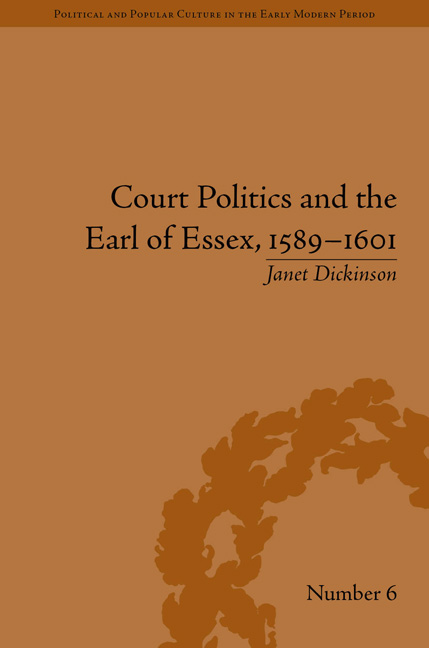Book contents
- Frontmatter
- CONTENTS
- Dedication
- Acknowledgements
- Introduction
- 1 Chivalric Culture and the Earl of Essex
- 2 The Virgin Queen and Her Lovers
- 3 ‘This Late Unhappy Accident’: The Rebellion of 1601
- 4 Faction in the 1590s?
- 5 Essex and Cecil
- 6 Essex and the Essexians
- 7 Elizabeth's Last Decade: Cult or Crisis?
- Notes
- Bibliography
- Index
7 - Elizabeth's Last Decade: Cult or Crisis?
- Frontmatter
- CONTENTS
- Dedication
- Acknowledgements
- Introduction
- 1 Chivalric Culture and the Earl of Essex
- 2 The Virgin Queen and Her Lovers
- 3 ‘This Late Unhappy Accident’: The Rebellion of 1601
- 4 Faction in the 1590s?
- 5 Essex and Cecil
- 6 Essex and the Essexians
- 7 Elizabeth's Last Decade: Cult or Crisis?
- Notes
- Bibliography
- Index
Summary
As has been apparent throughout this study, Essex's career was inextricably bound up with his relationship with the Queen. From the start of his time in her service, Elizabeth closely monitored Essex's activities. Their surviving correspondence demonstrates just how hard the earl had to work to keep the Queen happy, revealing how often he was required to report to her and in what detail. They also indicate what happened when things went wrong. Early on, in 1591, Elizabeth was clearly discontented with Essex's erratic behaviour in France. She paid close attention to what Essex was doing; in response to an apparent complaint that he had not reported back fully enough before meeting with the French king, Essex answered that ‘before my going to the K. I wrote 4 tymes in 14 dayes and had written 14 tymes if I cold have procured as many passages’. Elizabeth wished him to obey her directions, not those of his companions and was angered to discover that her instructions had been contravened, writing to remonstrate with Essex:
Where by sundry our late letters … we declared our pleasure to be that both you and our forces should return after the end of the two months, according as was accorded afore your going thither, and having shewed and sent you very good causes … such as if you have well studied them with a minde and judgement not blinded with vaine persuasions, ether of your selfe or of such others as doe accompanie you with their Glorious windie discourses, yowe would have readelie assented therunto.
- Type
- Chapter
- Information
- Court Politics and the Earl of Essex, 1589–1601 , pp. 115 - 126Publisher: Pickering & ChattoFirst published in: 2014

